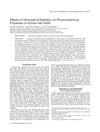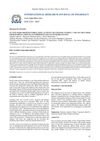 137 citations,
June 2005 in “Climacteric”
137 citations,
June 2005 in “Climacteric” Estrogen loss during menopause worsens skin health, but hormone replacement therapy may improve it, though more research is needed.
 93 citations,
April 2012 in “International Journal of Cosmetic Science”
93 citations,
April 2012 in “International Journal of Cosmetic Science” Improving skin barrier and using antifungal treatments can help manage dandruff.
69 citations,
January 2002 in “Journal of biomedical optics” Dyes can penetrate human skin and hair follicles up to 1.2 mm deep and the sebaceous gland can store dye; Indocyanine Green lotion was made for safe dyeing and monitoring.
61 citations,
March 2006 in “Colloids and surfaces. B, Biointerfaces” Lecithin microemulsion safely delivers tetracaine hydrochloride through the skin.
 52 citations,
December 2000 in “Archives of Dermatological Research”
52 citations,
December 2000 in “Archives of Dermatological Research” Scalp skin barrier affects hair loss; personalized treatments needed.
 50 citations,
November 2010 in “Otolaryngologic Clinics of North America”
50 citations,
November 2010 in “Otolaryngologic Clinics of North America” Recognizing oral symptoms can help diagnose and treat blood and nutritional diseases early.
 49 citations,
January 1980 in “Journal of Cardiovascular Pharmacology”
49 citations,
January 1980 in “Journal of Cardiovascular Pharmacology” Minoxidil doesn't increase pericardial disorder risk, but may cause fluid accumulation.
 24 citations,
July 2017 in “Structure”
24 citations,
July 2017 in “Structure” FGF9 controls which receptors it binds to through a process where two FGF9 molecules join, and changes in FGF9 can lead to incorrect receptor activation.
15 citations,
August 2020 in “Analytical chemistry” Hair lipids do not protect against humidity.
 15 citations,
March 2014 in “Biochimica and biophysica acta. Molecular and cell biology of lipids”
15 citations,
March 2014 in “Biochimica and biophysica acta. Molecular and cell biology of lipids” ACBP is essential for healthy skin and fur by maintaining the skin's barrier function.
13 citations,
March 2017 in “Skin Research and Technology” Formaldehyde damages curly hair more than glyoxylic acid.
 12 citations,
May 2014 in “International Journal of Molecular Medicine”
12 citations,
May 2014 in “International Journal of Molecular Medicine” Chrysanthemum zawadskii extract helps hair grow by stimulating hair cells.
 12 citations,
August 2013 in “Facial Plastic Surgery Clinics of North America”
12 citations,
August 2013 in “Facial Plastic Surgery Clinics of North America” Hair transplantation is the only permanent solution for female pattern hair loss and can greatly improve quality of life with careful planning.
11 citations,
May 1957 in “Journal of the American Medical Association” Emollient creams prevent skin dryness and benefit from shared knowledge between cosmetic makers and doctors.
10 citations,
December 2020 in “Palaeogeography, palaeoclimatology, palaeoecology” Elephant tusks and hair reveal seasonal diet and climate changes.
 8 citations,
November 2022 in “International Journal of Cosmetic Science”
8 citations,
November 2022 in “International Journal of Cosmetic Science” Human hair varies widely and should be classified by curl type rather than race.
 7 citations,
March 2019 in “Journal of cosmetic dermatology”
7 citations,
March 2019 in “Journal of cosmetic dermatology” African hair has the most lipids, while Caucasian hair is more hydrated and stronger.
 5 citations,
July 2023 in “International journal of biological macromolecules”
5 citations,
July 2023 in “International journal of biological macromolecules” The new wound dressing material speeds up healing, fights infection, and outperforms traditional dressings.
 5 citations,
March 2012 in “Microscopy Research and Technique”
5 citations,
March 2012 in “Microscopy Research and Technique” UVB radiation changes the chemical makeup and dries out human hair but doesn't alter its appearance or texture.
 4 citations,
July 2022 in “International Journal of Cosmetic Science”
4 citations,
July 2022 in “International Journal of Cosmetic Science” Hair moisture behavior helps tell apart different chemical treatments and reveals insights into hair structure.
4 citations,
August 2007 in “PubMed” Polyquaternium-70 shampoo is best for reducing frizz.
 3 citations,
January 2018 in “Chiang Mai University Journal”
3 citations,
January 2018 in “Chiang Mai University Journal” Centella asiatica extract may help promote hair growth.
Aloe vera and celery extract in microemulsion form significantly improve hair growth.
2 citations,
January 2019 in “Research journal of pharmacy and technology” Sterculia urceolata ethanol extract promotes hair growth in male rabbits.
 1 citations,
September 2022 in “River Publishers eBooks”
1 citations,
September 2022 in “River Publishers eBooks” The document concludes that hair keratin-chitosan scaffolds were successfully made and are suitable for biomedical use.
 1 citations,
October 2018 in “International research journal of pharmacy”
1 citations,
October 2018 in “International research journal of pharmacy” Rampai leaves extract can significantly stimulate hair growth.
1 citations,
January 2013 Glucosylceramides are essential for healthy skin and proper wound healing.
1 citations,
January 2012 in “Human health handbooks” Linoleic acid is important for healthy skin, and while most people get enough from their diet, not having enough can cause skin and hair problems.
Minoxidil and a solvent mixture can prevent hair loss caused by chemotherapy in mice.
August 2024 in “International Journal of Pharmaceutics” The treatment promotes hair growth, improves hair density, and reduces skin irritation.

















